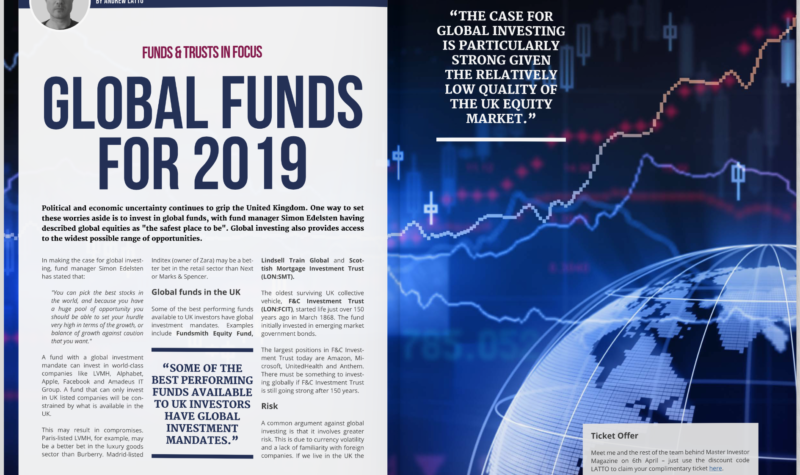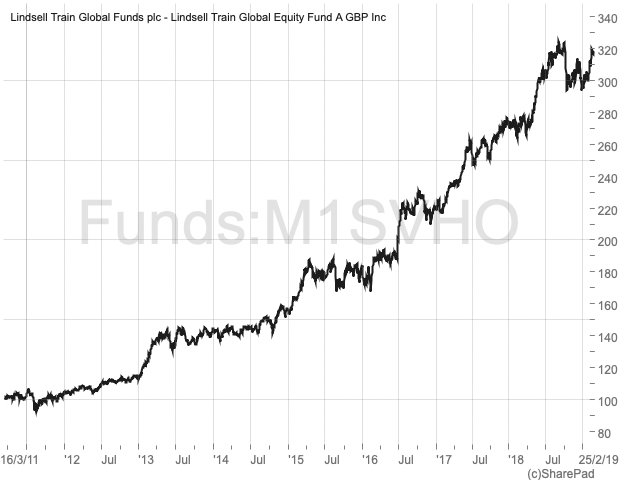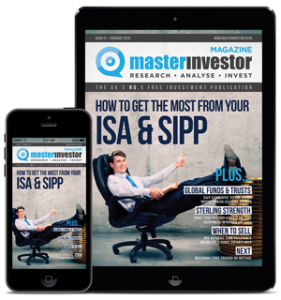Global funds for 2019

Political and economic uncertainty continues to grip the United Kingdom. One way to set these worries aside is to invest in global funds, with fund manager Simon Edelsten having described global equities as “the safest place to be”. Global investing also provides access to the widest possible range of opportunities.
In making the case for global investing, fund manager Simon Edelsten has stated that:
“You can pick the best stocks in the world, and because you have a huge pool of opportunity you should be able to set your hurdle very high in terms of the growth, or balance of growth against caution that you want.”
A fund with a global investment mandate can invest in world-class companies like LVMH, Alphabet, Apple, Facebook and Amadeus IT Group. A fund that can only invest in UK listed companies will be constrained by what is available in the UK.
This may result in compromises. Paris-listed LVMH, for example, may be a better bet in the luxury goods sector than Burberry. Madrid-listed Inditex (owner of Zara) may be a better bet in the retail sector than Next or Marks & Spencer.
Global funds in the UK
| First seen in Master Investor Magazine
Never miss an issue of Master Investor Magazine – sign-up now for free! |
Some of the best performing funds available to UK investors have global investment mandates.Examples include Fundsmith Equity Fund, Lindsell Train Global and Scottish Mortgage Investment Trust (LON:SMT).
The oldest surviving UK collective vehicle, F&C Investment Trust (LON:FCIT), started life just over 150 years ago in March 1868. The fund initially invested in emerging market government bonds.
The largest positions in F&C Investment Trust today are Amazon, Microsoft, UnitedHealth and Anthem. There must be something to investing globally if F&C Investment Trust is still going strong after 150 years.
Risk
A common argument against global investing is that it involves greater risk. This is due to currency volatility and a lack of familiarity with foreign companies. If we live in the UK the logic is that we should only invest in UK companies.
However, investing overseas reduces risk by lowering our exposure to a single country. If the UK economy and the stock market tank it will result in a double-whammy for a UK-based investor.
F&C Investment Trust spread its country-specific risk when it started in 1868 by investing in a range of countries. Only Spanish government bonds defaulted while the rest of the portfolio performed well.
To quote the great investor Sir John Templeton: “In my 45-year career as an investment counsellor, humility did show me the need for worldwide diversification to reduce risk.”
Home country bias
If global investing makes sense, the obvious question is why don’t more of us do it? Buying overseas shares directly is expensive. Foreign exchange costs start at around 1% and dividends can be subject to a withholding tax.
Investment funds offer an inexpensive and efficient way to buy into global markets. Exchange Traded Funds that invest in the S&P 500, for example, have ongoing charges that start at only 0.07%.
A risk factor that can deter investors is the potential for foreign currencies to decline in value. While this can have an impact, it is also the case that UK companies are increasingly impacted by exchange rate changes.
A lack of familiarity is also put forward as a reason to avoid investing in companies listed overseas. The reality is that we are often more familiar with foreign companies like Apple and Amazon than with UK listed companies.
To quote the founder of Fundsmith, Terry Smith: “Why anyone would want to limit their investment choices to the UK economy is beyond my comprehension, even if they are UK domiciled.”
Three global fund mandates
In a Financial Times article, Terry Smith put forward three global mandates: large cap, small cap and emerging markets. This was based on a 2010 paper by MSCI called “The ‘new classic’ equity allocation”.
Small companies and emerging market stocks have investment liquidity constraints. They are also buffeted by macro and individual stock risk to a greater extent than large companies.
A good starting point when investing globally is therefore funds that invest in developed-world large-cap (i.e. blue chip) stocks. These include established companies that have leading positions in their sectors.
Three fund categories
We can also put investment funds into three main categories: 1) passive funds; 2) open-end active funds; 3) closed-end active funds. Open-end funds include unit trusts and OEICs while closed-end funds include Investment Trusts.
A logical approach is for passive investment vehicles to be the default investment option. Higher cost active funds are only worthwhile if they have a good chance of outperforming the alternative passive fund.
Developed-world large-cap passive funds
iShares MSCI World ETF (SWDA) is a passive fund investing in large cap developed market companies. The ongoing charge is 0.2% and its status as an accumulation fund means that dividends are reinvested.
The biggest exposure in the ETF is the USA at 61% of assets, Japan is 8.6% of assets and the UK is 6% of assets. The largest sector exposure is to banks at 11.8% of assets while drug manufacturers are 9.9% of assets.
With 61% of the MSCI World ETF in US equities, an alternative is to invest directly in a US passive fund. iShares S&P 500 ETF (CSP1) invests in the 500 largest US companies and has an ongoing charge of 0.07%.
Technology is the largest sector with software and Internet companies accounting for 18% of total assets. The largest US companies are multinationals and include Microsoft, Apple, Amazon, Facebook, Alphabet and Johnson & Johnson.
Developed-world large-cap active funds
There are two high profile active open-end funds that invest on a global basis: Fundsmith Equity Fund and Lindsell Train Global Equity Fund. They both seek to build a concentrated portfolio of high-quality companies.
| First seen in Master Investor Magazine
Never miss an issue of Master Investor Magazine – sign-up now for free! |
The mantra of quality investors is to look for businesses they can own forever. These tend to be companies with sustainable competitive positions and stable demand. Portfolio turnover and trading costs tend to be very low.
Fundsmith Equity Fundwas launched on 1 November 2010 and currently has £16 billion under management. The institutional fund class, accessible through platforms, has a 0.95% ongoing charge and the fund currently has 28 holdings.
Lindsell Train Global Fundlaunched in March 2011 and currently has £5 billion under management. The B Class of the fund has an ongoing charge of 0.72% and currently has 29 holdings.
Turning to closed-end funds and Scottish MortgageIT is the UK’s largest investment trust with a market value of £7 billion. While the fund is dominated by its largest holdings, it owns stakes in 97 different companies.
Scottish Mortgage has done well by making successful investments in the global technology sector. At the end of 2018 Amazon was 9.3% of the fund, Tesla was 7% and Chinese Internet stocks were 15.2% of assets.
Seven and five-year performance (sterling terms)
The iShares MSCI World ETF has delivered a total return of 127% over the last seven years. However, the iShares S&P 500 ETF is up 175% over seven years with this highlighting the outperformance of US equities.
The Fundsmith Equity Fund has delivered a 230% return over seven years while Lindsell Train Global is up 239%. Investing in quality companies has proven its worth despite overall markets performing well.
Quality focused funds tend to prove their worth when equity markets experience weakness. The outperformance of Fundsmith Equity Fund and Lindsell Train Global during a bull market is therefore impressive.
Scottish Mortgage Investment Trust (SMT) has beaten all of its rivals with a 291% total return over 7 years. The investment trust is, however, behind both Fundsmith Equity Fund and Lindsell Train Global over the last five years.
Scottish Mortgage Investment Trust has done well on the back of its exposure to technology companies. Whether the performance is sustainable is open to question given the relatively high valuation multiples of Amazon and Tesla.
Fund total return to 18th January 2019
| iShares World ETF (SWDA) | Fundsmith Equity Fund | Lindsell Train Global | Scottish Mortgage IT
|
|
| AUM | £12 billion | £16 billion | £5 billion | £7 billion |
| Charge | 0.2% | 0.95% | 0.72% | 0.37% |
|
Total return |
||||
| 7 Yrs | 127% | 230% | 239% | 291% |
| 5 Yrs | 71% | 137% | 134% | 133% |
Source: SharePad
How does the UK equity market stack up?
The UK FTSE All-Share TR (Total Return) index has clocked up a gain of 67% over the last seven years. This compares to a 127% increase for the iShares MSCI World ETF (SWDA).
Whether global markets will continue to outperform the UK equity market is the million-dollar question. The UK equity market is also heavily skewed towards low return mature sectors such as banking, mining, oil & gas and real estate.
By contrast the US equity market, the main driver of global equities, is heavily skewed towards high return sectors with solid growth prospects. This makes it likely that global markets will outperform the UK market over the long term.
Active funds that invest in global markets are therefore likely to outperform active funds that invest in UK listed companies. UK mid and small-cap stocks are a possible exception if there are enough opportunities for stock pickers.
Return on equity
Financial ratios support the argument that global markets will outperform the UK All-Share TR index. Return on equity (ROE) is a key driver of returns with it representing the after-tax return earned on shareholder capital.
A high ROE can indicate potential to invest in growth while a low ROE makes reinvestment less worthwhile. The below data is from Vanguard and shows the ROE on the FTSE 100 at 10.9% versus 13.9% for the Developed World ETF.
This is clearly in large part to the high ROE on US stocks with the S&P 500 ROE at 16.3%. The figures are even starker given that the ROE for the UK is boosted by the financial leverage in the UK’s relatively large banking sector.
In the latest investor letter from Terry Smith, covering 2018, he states that: “The S&P 500…includes more quality companies than any other index.”
| FTSE 100 ETF | FTSE Developed World ETF | S&P 500 ETF | |
| Return on equity | 10.9% | 13.9% | 16.3% |
Source: Vanguard data
Summary
| First seen in Master Investor Magazine
Never miss an issue of Master Investor Magazine – sign-up now for free! |
The oldest UK collective fund, F&C Investment Trust, started by investing globally and is still going strong. The case for global investing is particularly strong given the relatively low quality of the UK equity market.
International investing can be daunting but it is easy to achieve through investment funds. Funds offer instant diversification and ETFs trade on stock exchanges alongside stocks.
Two passive fund options are iShares World ETF and the iShares S&P 500 ETF. Picking a country fund may not appear to be consistent with global investing but US companies are increasingly global in nature.
The Scottish Mortgage Investment Trust has performed well over the last seven years. With this in large part due to a sector bet on technology, it is not clear if the recent performance is sustainable.
Funds that focus on quality companies may be better placed to hold their own as the US equity bull market starts to wane. Lindsell Train Global Equity and Fundsmith Equity Fund are two possible options.
Fund of the Month: Lindsell Train Global Equity Fund
Lindsell Train Global Equity Fund’s objective is to “achieve capital and income growth over the long term.” The fund focuses on “those businesses with truly sustainable models and/or established resonant brands.”
This means investing in companies “demonstrating long-term durability in cash and profit generation.” The approach is to build a concentrated portfolio of global equities that are listed in developed countries.
At the end of 2018, 34.6% of the assets under management were in US stocks, 33.6% was in UK stocks and 20.6% was in Japanese stocks. The consumer staples sector was the largest exposure at 44.9% of total assets.
The three largest holdings at the end of 2018 were Unilever, Diageo and Heineken. The Japanese listed personal care and cosmetics groups Kao Corp and Shiseido are also top ten holdings in the fund.
The Communication Services sector was 21.8% of assets at the end of 2018 and Information Technology was 10.6% of assets. Financials accounted for 9.7% of assets with positions including PayPal and the London Stock Exchange.
Lindsell Train Global Equity appears to get less attention than the Fundsmith Equity Fund and the Scottish Mortgage Investment Trust. The other funds have no exposure to Japan and are not as heavily exposed to consumer staples.
Lindsell Train Global Equity has occasionally made a number of conviction driven bottom-up stock calls. World Wrestling Entertainment is a good example with the share price up over 300% since the start of 2017.
Fundsmith, by contrast, seeks to invest in in companies that “have already won.” Most Lindsell Train Global holdings are established businesses and include Walt Disney, PepsiCo, Mondelez, Intuit, EBay, Dr Pepper Snapple and Brown-Forman.
Lindsell Train’s best ideas
In my view, the Lindsell Train Global Equity Fund can also be thought of as a “best ideas” fund for the Lindsell Train group. The fund appears to borrow the best ideas from the Japanese and UK funds that fund manager also runs.
If this is the case, we would expect the global fund to outperform the other funds run by Lindsell Train. Over a seven-year period Lindsell Train Global has delivered a 239% total return.
This compares to a 221% return on the Japanese Fund (in yen terms) and a 158% return for the UK open-end fund. The Finsbury Growth & Income Trust (run by Lindsell Train) has achieved a 155% return over seven years.
The Lindsell Train’s Global Fund leads the pack
| Lindsell Train Global | Lindsell Train Japan | Lindsell Train UK Equity | Finsbury Income & Growth | |
| 7 year total return | 239% | 221% | 158% | 155% |
Lindsell Train Global Fund has therefore outperformed the other three funds run by the group. This supports the argument that global funds deliver stronger results over the long term.
There is, however, one Lindsell Train fund that has beaten the rest: The Lindsell Train Investment Trust. However, this is because 46% of the value of the investment trust is account for by its shareholding in Lindsell Train Limited.
| Fund Facts – Lindsell Train Global Equity (SEDOL: B3NS4D2)
Type: Open End Investment Company (OEIC) IA Sector: Global Total Assets: £5.2 billion Launch Date: March 2011 Current Yield: 0.702% Ongoing Charges: 0.72% (B Class) Website:www.lindselltrain.com |


Comments (0)